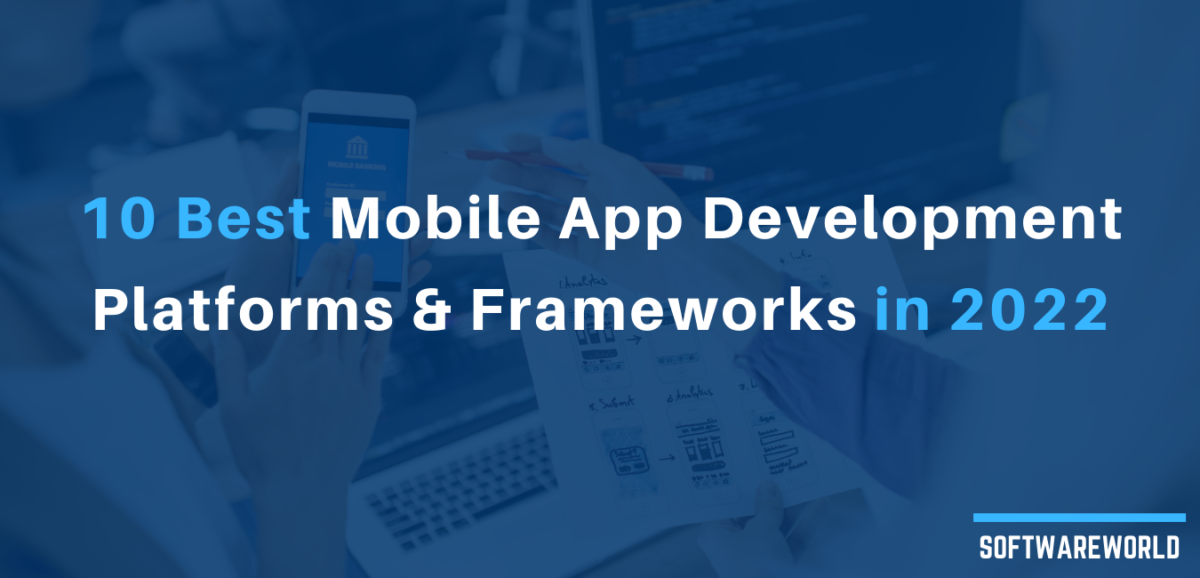Table of Contents
It is not surprising that with 6.5 billion-plus smartphone users globally and predicted to reach 7.6 billion in 2027. As a result, the mobile app development platform market will generate a revenue of $14 billion by 2023. Adding to the smartphone market of the 1.14 billion tablet users globally, the demand for mobile apps will not slow down in the foreseeable future.
With the figures like a person using nine apps daily and thirty apps every month, it won't be far-fetched to state that investing or developing app development companies is a promising venture. However, knowing the right platform to leverage benefits is essential. The primary step in ensuring it is understanding the best mobile app development platforms and frameworks.
With so many platforms available in mobile app development, it is challenging to select the correct forum. While the increasing number is enabling developers and entrepreneurs to work on different features and elements of an app, it is also increasing the competition and providing more choices to the customers.
In this article, we will discuss the top 10 mobile app development platforms in the market and why it matters. But before that, for those new to the world of mobile app development and thinking of taking a deep dive into it, here is a quick overview of the basics.
» What Are Mobile App Development Platforms?
Since the advent of smartphones and smart mobile devices, companies have shown that one of the best ways to warrant their increase in customer base is by mobile applications. As a result, companies have developed various mobile app development frameworks, commonly known as MADP (mobile application development platform).
To explain what MADP is, one can state it is a set of tools, technology, and services that allows a mobile app developer to assemble different elements and features for creating an application. The platform's utility is more than just helping make the application; it allows the developer to design, develop, and test the application. The app creator can then deploy the app across multiple mobile platforms, networks, and devices while maintaining and updating them regularly.
Any developer would say that designing, developing, and running a mobile application is a complicated task requiring learning complex computer languages. However, with MADP, the developer needs to know all languages like CSS, HTML, or JavaScript. They can maintain a single codebase compatible with other devices, networks, and platforms.
The streamlining of MADP makes app development easy at a faster turnaround time that is cost-effective.
» Why Should You Use MADP For Mobile App Development?
There are many app development companies that build mobile apps without MADP. However, developing a mobile app on a MADP offers quite a few benefits that can be termed QUICK, an acronym that Leenesh Singh created.
Here is what QUICK stands for:
› Quick Development
As mentioned earlier, it offers a quick turnaround time. This is possible because a single cross-platform app can perform across all the other platforms. No longer the developer needs to build a native app for every platform. With most development platforms now offering ready-to-use modules and pre-existing plugins, developing the app is much faster, hence improving time to market.
› User Experience
It is easier to offer a consistent user experience on all platforms with a single developer and cross-platform development in place. However, it can be challenging to sync the experience when different teams on the various platforms are developing the app.
› Increased Coverage
The mobile market is growing exponentially. The leading players, iOS, Android, and Windows, are offering their platforms. When you use these three and other major MADPs, you can leverage it as a company that wants to target and increase its customer base.
› Cost-Effective
When you can create an app across multiple platforms by working on one, the development cost comes down. In addition, with a single code, you can maintain and update the app across all the platforms, networks, and devices, thus reducing the app development and maintenance cost.
› Knowledge
It isn't easy to find a developer who knows all the platforms and languages. However, with MADP in place, you need a knowledgeable developer with single language knowledge. Moreover, with mobile app development tools integrated within the platform, it is easy for developers to work on cross-platform apps.
Now that you have an idea of the benefits of writing and developing an app on MADP, it is time for you to choose the right mobile app development platform.
Top 10 Mobile Application Development Platforms List
App development approaches can differ among the developers like native apps, cross-platform apps, hybrid applications, and progressive web applications. Similarly, technologies used in developing mobile applications can change, e.g., Reactive Native, Flutter, and Ionic.
While these factors do influence the type of mobile application development, the other factor influences the mobile app development platform selection. The way you intend to transform the business with the app is the speed, agility, and innovation you want to bring in.
You can select one of the mobile app platforms from the list based on these. We are offering a mobile app development platform comparison for you.
1. Reactive Native
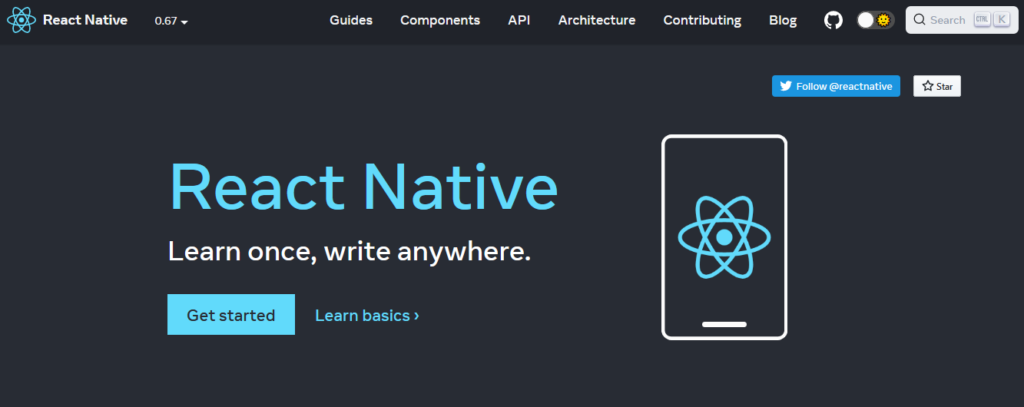
Facebook supports this easy-to-access cross-platform application and is one of the preferred options for programmers. It facilitates iOS and Android mobile applications and is being used by Skype, Amazon prime, and Tesla. The appeal of Reactive Native is the implementation and development of the app are quick and easy. It also offers easy third-party extension and integration with reusable elements.
Features of Reactive Native
-
- GUIGUI creation which is component-based for front-end apps
- Enhanced performance
- Extremely compatible with third-party extensions.
2. Flutter
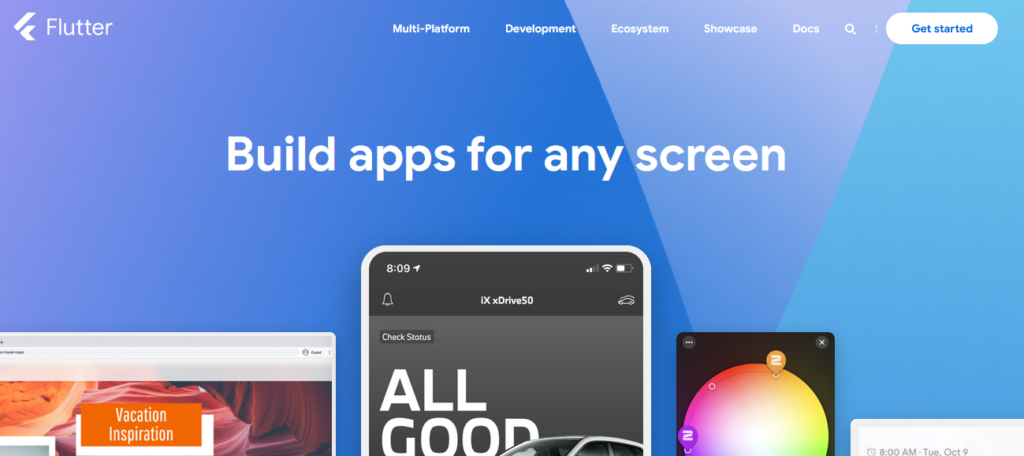
A simple codebase can create native apps for Android and iOS applications. The platform offers a dependable and unparallel UIUI framework for smartphones for developing swift and attractive apps. The SDK for the cross-platform is ground-breaking and provides a novel way to create apps that give native apps. It is a comprehensive framework. Google offers it with this platform that has widgets, integrating APIs, debugging, and rendering engine. It allows the creators to deploy well-crafted mobile apps. It is, of course, used by Google.
Features of Flutter
-
- Rapid development
- Visuals are engaging and appealing
- Open and free mobile app development frameworks
3. Xamarin
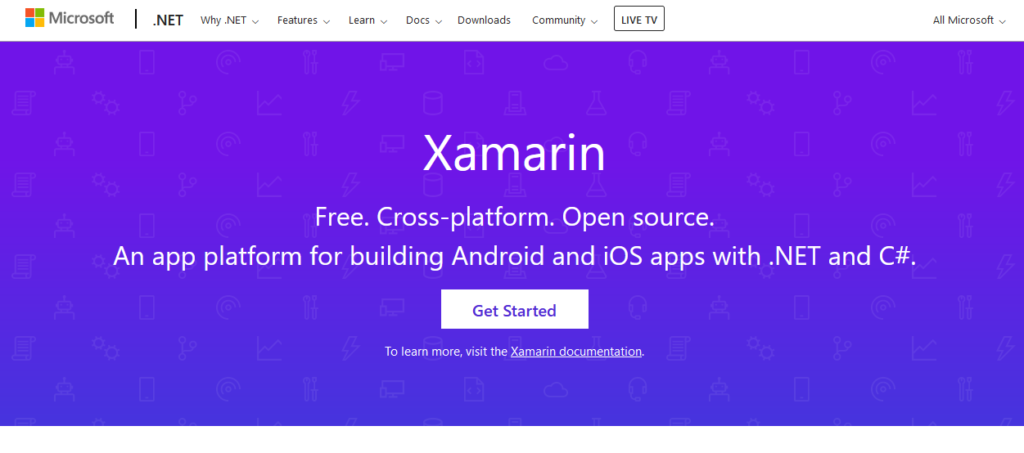
Programmers can use less coding since the C# programming language offers a quicker development process. The platform offers app development for Android and iOS. It also enables the programmer to transfer scripts at a fast pace to other systems like macOS and Windows. Xamarin's quick and flawless app delivery has resulted in Microsoft acquiring the framework. It also has an intermediate layer that connects and controls standard and core system codes.
Features of Xamarin
-
- It connects with Microsoft Visual Studio
- Compatibility with a wide range of devices
- An engaged community with different tools and language for a cultivated environment with APIs
4. Swiftic
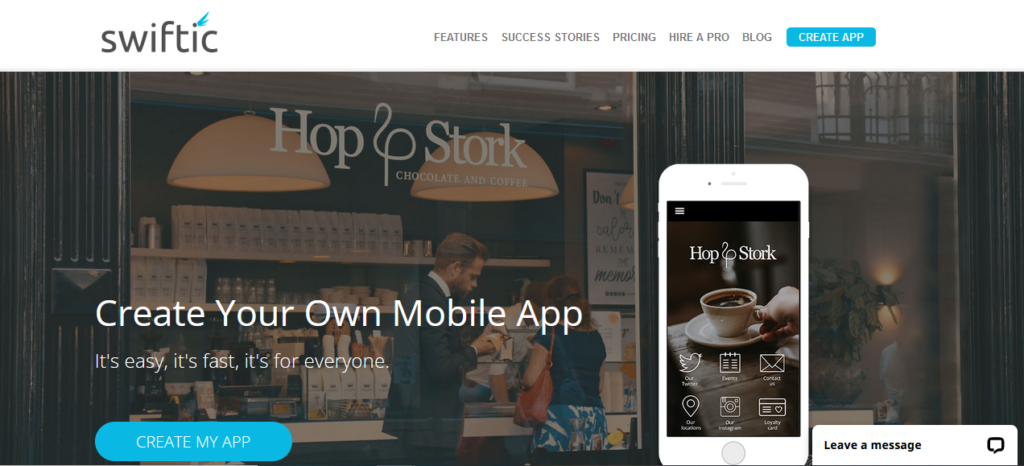
Programmers can easily integrate materials from the internet on the platform to create a DIIYDIIY mobile app. One of the most supple mobile application development platforms offers straightforward strategies, user experience, and specialized banking. In addition, it has easy to integrate social media platform feeds, push notifications, app advertising, and other features. One of the most straightforward app development platforms without compromising on the design, launch, and efficiency.
Features of Swiftic
-
- Easy to interact and navigate
- Seamless integration with third-party
- Programmers can avail 30 days money-back guarantee
5. Ionic
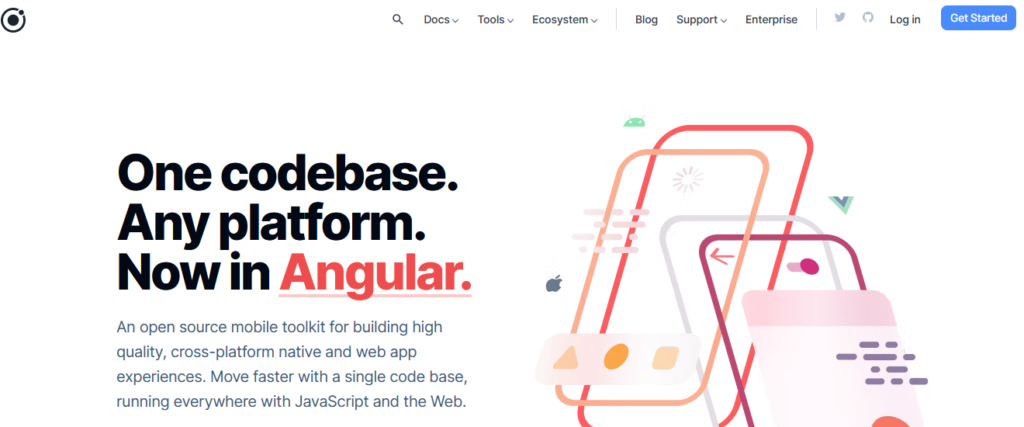
Any developer who wants to create feature-rich and solid native apps Ionic is the platform. The framework is beneficial for crafting Progressive Web Apps cross-platform and hybrid applications. Ionic uses Apache Cordova (PhoneGap), which is an accessible framework. Also, using the platform, programmers can create iOS and Android application which is feature-rich and solid in the native structure. Ionic has impressive UIUI components, filtration, easy navigation, inputs, views, and action sheets.
Features of Ionic
-
- The interface is consistent
- Offers immense flexibility for the user
- Apps can be developed across various platforms
6. Alpha Anywhere
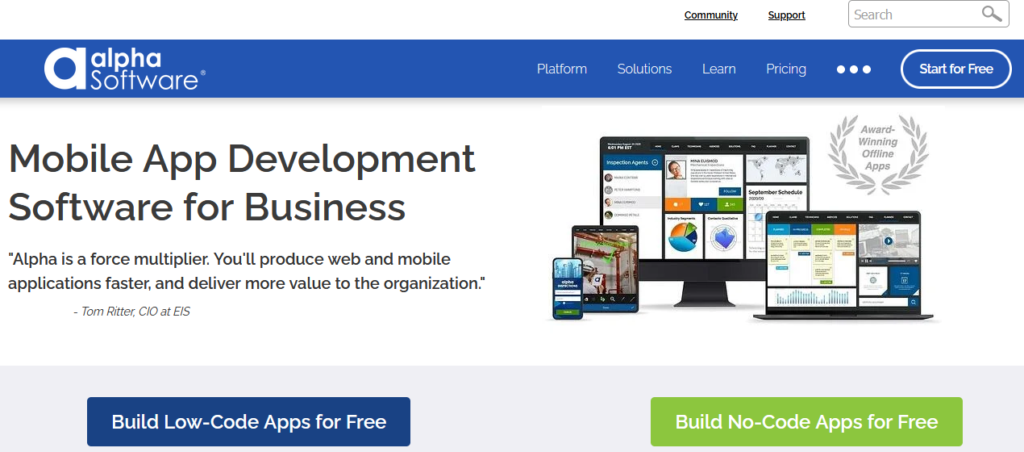
It is a low code application development platform that has comprehensive front and back-end features and functionalities. Often used when rapid development is required. Alpha Anywhere is known for fast distribution and deployment for Android and iOS platforms. In addition, the framework's coding-optional technology gives the developers freedom while increasing their productivity.
Features of Alpha Anywhere
-
- Can connect easily with both n-SQL and SQL database
- Large data storage capacity with flexible resolution
- Tight charting and integrated analytics features
7. Mendix
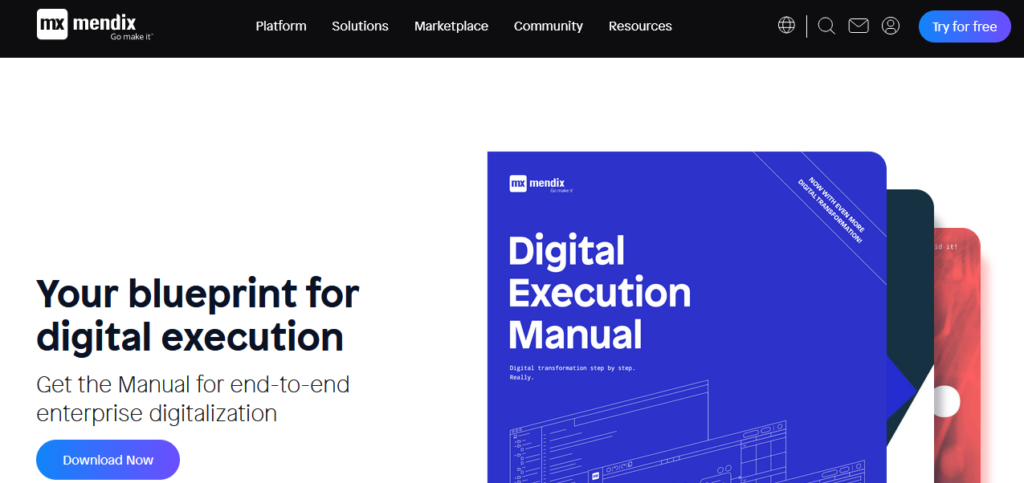
The low-code facility offered by the framework makes it in demand among business that wants to develop mobile apps that is fast to market from ideation to application with high performance. Both DevOps and Agile can be implemented on Mendix with ease by the developers with a no-code tolling facility. It is easy to develop a mullti0dimensional app on a fully integrated platform with this framework.
Features of Mendix
-
- Enterprise-grade applications
- Fast turnaround time between ideation and deployment
- Cloud architecture is used for building the platform
8. Sencha
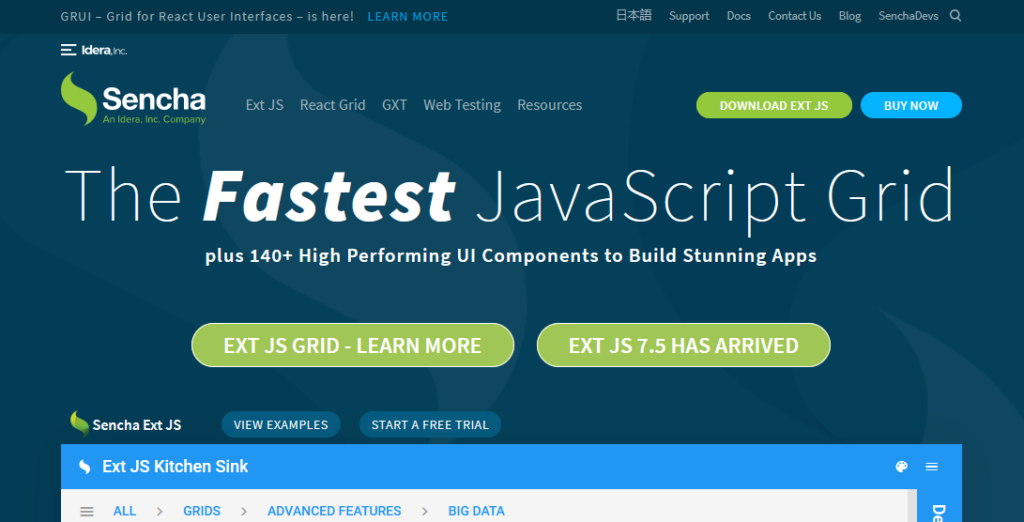
Any business that wants to improve customer satisfaction with their app, then Sencha is the platform. The Sencha Ext JSJS is developed on a JavaScript platform and is MVC-based. The USP of Sencha is the impressive responsiveness that the apps developed on the framework have. In addition, it is one of the few frameworks in the market that has the robust feature of building apps that are data intensive.
Features of Sencha:
-
- The data representation is flexible with an easy layout system
- A configuration system that can be rationalized
- Supports touch and animation events
9. Apache Cordova (formerly PhoneGap)
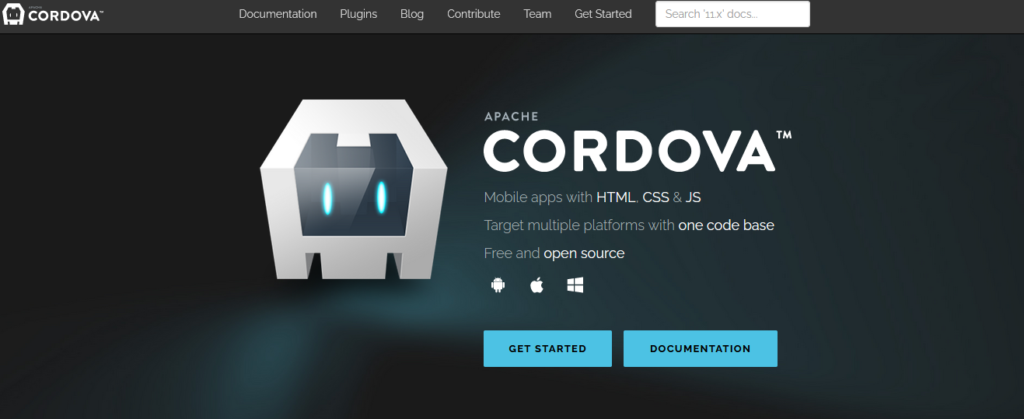
Android developers mostly prefer the platform. An app developed on this Adobe and Apache-backed framework can work efficiently on all mobile devices. The best part of the platform is that it is a desktop application that is open-source and can easily link the app to a mobile device. Furthermore, it is compatible on all platforms and has a strong back-end with easy app development.
Features of Adobe PhoneGap
-
- Can be easily integrated with different libraries
- Developers can use CSS3, HTML5, and JavaScript to develop the app efficiently
- The functionality can be extended with a plugin architecture
10. NativeScript
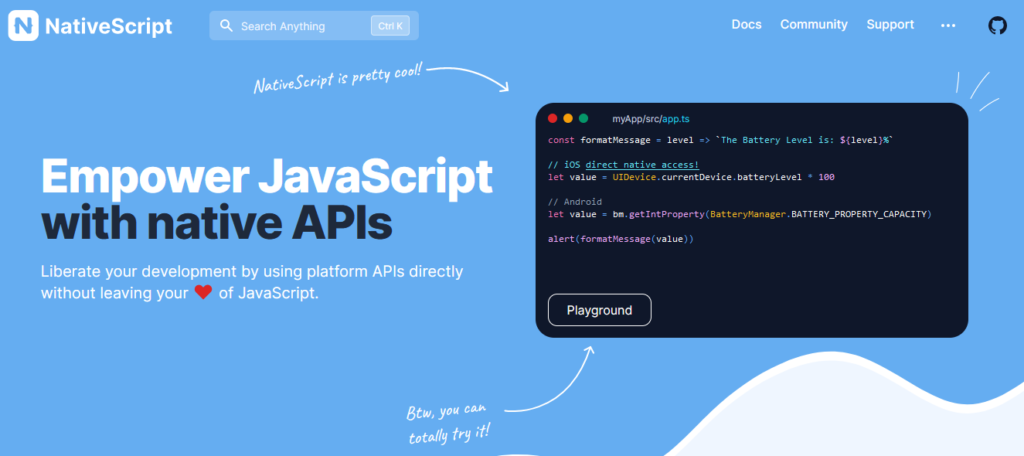
This is their go-to option for any developer or app development business that wants to create a native mobile application. The framework is intuitive to help the developer reduce the coding time and the loading of the native app. Additionally, it has a unique and robust web empowerment platform.
Features of NativeScript
-
- Over hundreds of NativeScript plugins available to build an impressive app
- Offers real-world app complete implementation support thrice
- Can work efficiently as a cross-platform mobile app
These are our top ten mobile application development platforms list.
Now that you have an idea of MADP and its purpose of offering the multi-experiences. How does a developer or business choose the best mobile app development platform?
» How To Choose The Best Mobile App Development Platform?
With so many mobile app development platforms in the market and so many vendors, we are sure that there is no lack of options. So, the question keeps looming about finding a suitable platform that will complement the enterprise and the app.
Here are some ideas that you can consider when selecting the platform for your mobile app.
› Low-coding: Look into how the platform support non-coding and other low coding approaches like declarative, drag-and-drop, metadata-driven, or model-driven.
› Code-centric Approach: Analyse developers' freedom with the code-centric approach in designing and developing the apps. Does the developer have to use the IDE that the MXDP supplies, or can they use open-source IDE or plugins?
› Reusable App: If you already have an app and want to use the existing codes and other features, opt for a platform that offers micro apps patterns and portability of apps.
› Service Architecture: Understanding the microservices serverless requirement and other such platform architecture is essential.
› Back-end Services: How good is the integration with third-party, user management, offline synchronization, and other API designs of the platform? These factors are essential in deciding the framework.
› Cloud Service: Does the framework has in-built cloud support and services for the apps developed and used?
› Security: The platform must provide robust security for the app and data protection and recovery facility in case of a breach.
› Open Source: It is crucial to find a framework that offers easy library integration and easy access to the APIs.
› Future Ready: There is no point in developing an app that becomes obsolete in a few months with technological development. The platform must be future-ready to integrate and update features and functions for years to come.
Last but not least, when selecting the platform, go through the customer rating and advice of the experts in the field.
Summing It Up!
It is apparent that many factors need to be understood and weighed in when selecting and developing the mobile app. One is identifying the right platform after spending considerable time in mobile app development platform comparison. While we have curated the list for you, it is up to you and the developer to find the proper framework.
At the rate at which the mobile app and the devices are being revolutionized, we are witnessing a paradigm shift in the knowledge base and the app development methods. But at the core of all these changes is to offer the best experience to the end-users/customers of the app. So, the drive to provide the best apps while reaching a more extensive audience section remains the primary criteria. As a result, the need to use MADP is increasing.
